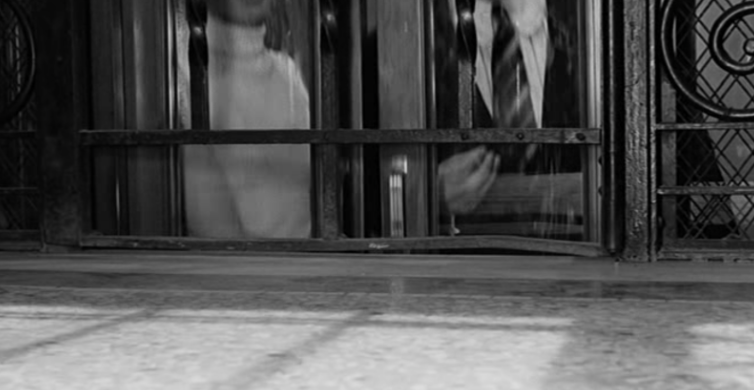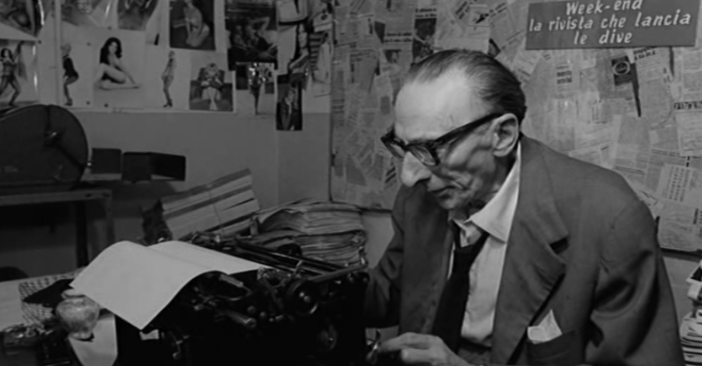Regia / Director: Antonio Pietrangeli, 1965
Qualcuno sta stendendo un lenzuolo su un filo in un cortile rumoroso. La macchina da presa fa una panoramica verso l'alto, rivelando file di ballatoi dove altri panni sono stesi ad asciugare e i bambini corrono e giocano. Infine, la telecamera zooma sull'ascensore, che in realtà stava seguendo dall'inizio.
Someone is hanging a sheet on a line in a noisy courtyard. The camera pans across and upward, revealing rows of balconies where more laundry is drying and kids run and play. Finally, the camera zooms in on the elevator, which in fact, it’s been following from the beginning.
All'interno dell'ascensore, vediamo il riflesso di Adriana in uno specchio. È con Cianfanna (Nino Manfredi), un agente pubblicitario. Lui dice: "Se una ragazza ha le doti del successo, lo sento subito, come se avessi un contatore Geiger nella testa".
Inside the elevator, we see Adriana’s reflection in a mirror. She’s with Cianfanna, a publicity agent. He’s saying, “If a girl’s got the qualities it takes to succeed, I sense it immediately, as if I had a Geiger counter in my head.”
Nell'inquadratura successiva, è Cianfanna che vediamo allo specchio. Quando l'ascensore si ferma improvvisamente, dice: "Ecco fatto. Siamo arrivati".
"È andata via la corrente?"
"Macchè, è il vizietto dell’ascensore. Infatti, quando vado di fretta, non lo prendo mai".
In the next shot, it’s Cianfanna who’s in the mirror. When the elevator suddenly stops, he says, “There it goes. We’ve arrived.”
“Did the power go out?”
“No, it’s this elevator’s bad habit. In fact, I never take it when I’m in a hurry.”
Lei prova a premere i pulsanti, ma lui le dice: "È inutile. Non risponde”.
Quando lui apre la porta, vediamo che i loro menti sono al livello del piano successivo.
Lei grida: "Portiere! Portiere!"
"Sì, vada a cercare il portiere", dice lui con sarcasmo.
"Ma allora che si fa?"
"Serve uno che ci chiami da sopra".
She tries pressing the buttons, but he tells her, “It’s no use. It doesn’t respond.”
When he opens the door, we see that their chins are at the level of the next floor.
She yells, “Porter! Porter!”
“Sure, go look for the porter,” he says sarcastically.
“But then what do we do?”
“We need someone to call from upstairs.”
Fuori, un bambino siede a gambe incrociate sul ballatoio, indossando un elmetto coloniale. Cianfanna lo chiama: "Ragazzino, fai una corsa al piano di sopra a chiamare l'ascensore!"
Outside, a boy sits cross-legged on the balcony, wearing a pith helmet. Cianfanna calls to him, “Kid, run upstairs to call the elevator!”
Il ragazzo lo ignora. Cianfanna grida: "Oh! Coso*!" Lentamente il ragazzo si gira, punta il fucile giocattolo e spara come se fosse in un film hollywoodiano.
*“Coso" è una parola dispregiativa, il maschile di "cosa".
The boy ignores him. Cianfanna yells, “Ho, you!” Slowly, the boy turns, aims his toy rifle, and fires as if he were in a Hollywood movie.
*“Coso” is a disparaging word, the masculine for “thing."
Cianfanna, spaventato, chiude le porte. "Quel figlio di un sottoscala!"*
Ma all'improvviso l'ascensore si avvia, muovendosi verso l'alto.
*Letteralmente il figlio di qualcuno che vive in uno spazio sotto le scale o in cantina. Cianfanna inventa questo insulto, che sottintende che la famiglia del ragazzo vive in povertà, per evitare di dire qualcosa di più volgare.
Startled, Cianfanna shuts the doors. “That son of a bum!”*
But abruptly the elevator starts, moving upward.
*Literally the son of someone living under the stairs or in the basement. Cianfanna invents this insult, that implies the boy’s family lives in poverty, as a way to avoid saying something more vulgar.
Una macchina da scrivere manuale si blocca ripetutamente. Vediamo le dita del dattilografo che si avvicinano per sbloccarla.
Adriana siede in silenzio, osservando. Notiamo una nuova pettinatura: si tratta infatti di una parrucca, corta e scura, con frangia. Indossa un maglione bianco senza maniche e grandi orecchini.
A manual typewriter jams repeatedly. We see the typist’s fingers reach in to unstick it.
Adriana sits quietly, observing. We notice a new hairdo: in fact, a wig, short and dark, with bangs. She wears a sleeveless white sweater and big earrings.
"Porco Giuda!" borbotta il dattilografo, sbloccando la macchina da scrivere nuovamente. È un uomo con gli occhiali e la cravatta che pende allentata dal colletto. Dietro di lui, un cartello dice: "Week-end, la rivista che lancia le dive".
È il direttore della rivista, e legge ad alta voce ciò che ha scritto: "Presentiamo ai nostri lettori, ecc. ecc., Adry Astin, promettente giovanissima stellina..."
“Judas Priest!” mutters the typist, unsticking the typewriter again. He’s a man in glasses with his tie hanging loosely at the collar. Behind him, a sign says, “Week-end, the magazine that launches divas.”
He’s the editor of the magazine, and he reads aloud what he’s written: “We introduce to our readers, etc. etc. Adry Astin, promising young starlet–”
La macchina da presa fa una panoramica su una parete piena di scatti pubblicitari di giovani donne, per lo più in costume da bagno.
"...a cui non è difficile pronosticare un brillante e sicuro avvenire telecinematografico. Pratica – dannazione! - nuoto, tennis ed equitazione". La macchina da presa si ferma su Adriana e Cianfanna.
The camera pans a wall full of publicity shots of young women, mostly wearing bathing suits.
“– for whom it’s not difficult to predict a brilliant and certain future in cinema and TV. She participates in – damn it! – swimming, tennis, and horseback riding.” The camera rests on Adriana and Cianfanna.
Adriana chiede: "Chi, io?"
"Sta’ buona. Non t’impicciare!"
Adriana asks, “Who, me?”
“Be quiet. Don’t butt in!”
Premendo i tasti mentre parla, il direttore continua: "Ha già firmato con un'importante casa di produzione un contratto – Ah! Io la butto! – per un film che sarà girato presto".
Pecking out the letters as he speaks, the Editor continues, “She’s already signed with an important production company – Ach! I’ll throw this thing out! – for a film that will be shot soon.”
"Non è vero nulla!" dice Adriana.
"Vuoi imparare il mestiere del Direttore? Alba Dantez, l’ha lanciata lui!"
"Chi è Alba Dantez?"
“None of it’s true!” Adriana says.
“Are you going to learn the Editor’s job? He gave Alba Dantez her start!”
“Who’s Alba Dantez?”
Sfogliando le foto pubblicitarie, Adriana fa un grande sorriso. "Guarda! Questa la conosco!"
"È Jenny Flower! È di Sulmona".
Leafing through publicity photos, Adriana breaks out in a big smile. “Look! I know this one!”
“That’s Jenny Flowers! From Sulmona.”
Guardando direttamente nella macchina da presa, lei dice: "Tre anni fa a Castellammare... Mi ricordo che era la ragazza che stava proprio davanti a me..."
In un flashback, vediamo un concorso di bellezza: donne in costume da bagno camminano in cerchio, ognuna con un numero. Sopra di loro, uno striscione dice: "Miss Castellammare".
Looking directly into the camera, she says, “Three years ago in Castellammare… I remember she was the girl who was right in front of me…”
In flashback, we see a beauty pageant: women in swimsuits walk in a circle, each carrying a number. Above them, a banner says, “Miss Castellammare.”
"Jenny Flower" – ripete Cianfanna – "Ha inondato di foto tutti i giornali. Le è costato una fortuna e non gliele ha pubblicate nessuno. Vedi che vuole dire non avere uno che ti rappresenta?"
Sfogliando le foto, Adriana ha un improvviso sussulto.
"Bellissima questa!" dice Cianfanna.
"No, senti, però farsi fotografare così, oh!"
"Ma certo! Così si fa. Senza trucco e senza inganno, eh! Ma tu foto così non ne vuoi fare!"
“Jenny Flowers,” Cianfanna repeats. “She flooded all the papers with pictures. It cost her a fortune and no one published them. Do you see what it means not having someone represent you?
Still leafing through the photos, Adriana suddenly gasps.
“Beautiful girl!” says Cianfanna.
“No, listen, but being photographed like that, oh!”
“But of course! That’s how it’s done. Without trickery or deception, right? But you don’t want to take pictures like that!”
Espandendo il suo punto di vista, le mostra un'altra foto: "Guarda! Che senso ha questa fotografia col gonnellino e il reggiseno? Guarda qua! Mi sembri una monaca!"
Expanding on his point, he shows her another photo: “Look! What sense does this picture make with the skirt and bra? Look here! You look like a nun!”
"Dammi una sigaretta. Non le porto per levarmi il vizio! Macchè!"
Lei tira fuori un pacchetto e gliene dà una.
“Give me a cigarette. I don’t carry them to get out of the habit. But it doesn’t work!”
She takes out a pack and gives him one.
Il Direttore si avvicina, basso e curvo. "Ecco qua, il prossimo numero in contro copertina. 10.000 lire".
Cianfanna spiega: "Per le spese di stampa..."
The Editor comes over, short and stooped. “Here it is, the next edition on the back cover. 10,000 lira.”
Cinafanna explains, “For printing costs…”
Gli uomini la guardano affamati mentre lei infila la mano nella borsetta e tira fuori i soldi.
The men watch hungrily as she reaches into her purse and holds out the money.
Cianfanna chiede: "Non li hai spicci?" Ma il Direttore agguanta subito i soldi e se li mette in tasca.
Cianfanna asks, “Don’t you have anything smaller?” But the Editor quickly snatches the money and puts it in his pocket.
All'uscita, quando Adriana è già fuori, Cianfanna si sofferma un attimo.
"Per me come facciamo? Ci rivediamo?" chiede.
Il Direttore risponde: "Vieni quando vuoi, sono sempre qui. Mica scappo!"
Cianfanna tornerà più tardi per la sua parte di denaro.
On the way out, when Adriana is already outside, Cianfanna lingers a moment.
“For me, how do we do it? Do we meet again?” he asks.
The Editor replies, “Come when you want, I’m always here. I’m not running away!”
Cianfanna will come back later for his share of the money.
FINE PARTE 3
Ecco the link to Parte 4 of this cineracconto! Subscribe to receive a weekly email newsletter with links to all our new posts.














































